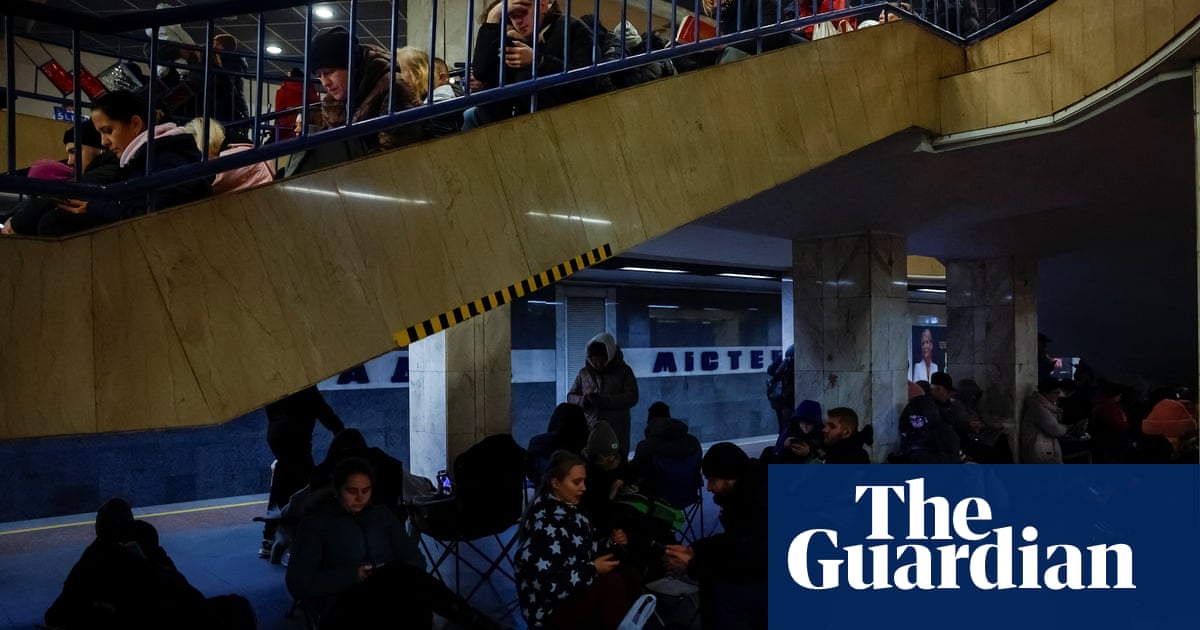


Russia launched more than 200 missile and drones at Ukraine’s energy grid overnight and in the early morning, killing seven people in its largest-scale attack in months, and forcing the country to announce nationwide electricity rationing from Monday.
Ukrenergo, Ukraine’s principal energy supplier, said blackouts and consumption restrictions would be introduced “in all regions” as engineers tried to repair as much of the damage to power facilities as possible.
Volodymyr Zelenskyy, the Ukrainian president, said about 120 missiles and 90 drones had been fired into Ukraine in a nationwide attack he described as the work of “Russian terrorists”.
The attack was the largest missile and drone assault on Ukraine since August and the first big Russian assault since the US election, showing the Kremlin in little mood to compromise after Donald Trump’s victory.
Andrii Sybiha, Ukraine’s foreign minister, said: “Russia launched one of the largest air attacks: drones and missiles against peaceful cities, sleeping civilians, critical infrastructure.”
He described the strike as Moscow’s “true response” to leaders who had interacted with Vladimir Putin, an apparent swipe at the German chancellor, Olaf Scholz, who placed a phone call to the Russian leader on Friday for the first time since December 2022.
Poland and Nato allies scrambled jets to safeguard its airspace in border areas early on Sunday, the country’s operational military command said, returning to their bases about three hours later without incident. Moldova said Russian drones and missiles had violated its airspace.
Attacks on critical infrastructure were reported in the regions of Lviv, Ivano-Frankivsk and Rivne in the west as well as in Kriyvi Rih and Vinnytsia in central Ukraine, Odesa in the south and the capital, Kyiv.
Two people were killed and six wounded in a drone strike on the southern city of Mykolaiv, the president said, and two people killed in Odesa.
Other reports said two rail workers were killed after a depot was hit in Nikopol’, while another person was reported dead and two injured in Lviv oblast, according to local officials.
Power cuts were reported around the country though it was at first unclear how serious the damage was as some outages were deliberate to protect the wider network from surges. It is the eighth time Ukraine’s power grid has been targeted this year, the energy company DTEK said, but the first at the onset of winter.
Several explosions could be heard in Kyiv shortly after 7am, and in the capital’s Pechersk district one woman was reported in hospital after a residential building was hit by a drone fragment, while a second person was treated on site.
Kyiv’s mayor, Vitalli Klitschko, said rocket fragments and drone debris had also fallen in other parts of the city, but there were no reports of casualties or damage from the incidents.
F-16 fighters, donated from Europe, were scrambled as part of the country’s defence shooting down 10 “aerial targets”, Zelenskyy said. Soviet-made Sukhoi and MiG fighters as well as ground defence teams were also involved.
Nataliya Grabarchuck, a former preschool teacher, shot down a Russian cruise missile with an Igla surface-to-air interceptor with her first shot, Ukraine’s military said. It was her first “combat launch”, the country’s armed forces said.
The Ukrainian air force said 144 incoming objects were brought down, including 102 of the 120 missiles and 42 of the 90 drones. A further 41 drones were lost, presumed brought down by jamming, and two flew towards Russia or occupied territories.
Donald Tusk, the Polish prime minister, echoed Sybiha’s remarks on leaders who speak to Putin in his condemnation of the Russian barrage. “The attack last night, one of the biggest in this war, has proved that telephone diplomacy cannot replace real support from the whole west for Ukraine,” he said.
Keir Starmer, the British prime minister, said he had no plans to speak to Putin. Starmer was speaking as he flew to Brazil for a G20 summit, where he said Ukraine would be at the top of the agenda for discussion in the absence of the Russian leader.
Starmer highlighted the presence of about 10,000 North Korean soldiers as Russian reinforcements, saying it showed the “desperation of Russia” and meant the conflict now had an additional element, involving security in the Indo-Pacific.
“That’s why I think we need to double down on shoring up our support for Ukraine and that’s top of my agenda for the G20,” he said.
On Friday evening, after the call, the Kremlin released its account of the discussion with Scholz, in which Putin gave little sign of abandoning his maximalist war demands.
Any peace negotiations should address Russian security concerns, the Kremlin added, and “rest on the new territorial realities” – a reference to the Russian occupation of the east and south of Ukraine – and to “eliminate the original causes of the conflict”, described as Nato’s desire to use Ukraine as “a staging ground”.
In an interview with Ukraine’s Suspilne radio released on Saturday, Zelenskyy said he hoped the war would end in 2025. Victory, he said, would amount to “a strong Ukraine” emerging either on the battlefield or through diplomacy.
The president also insisted that the US under Trump could not force Ukraine into a humiliating or unattractive peace settlement. “We are an independent country,” Zelenskyy said, adding: “The rhetoric of ‘sit down and listen’ does not work with us.”
In response, Elon Musk, a billionaire adviser to Trump, sought to undercut the Ukrainian president. “His sense of humour is amazing,” Musk posted on X. Musk’s Space X company provides Starlink satellite internet services of critical importance to Ukraine for battlefield communications.